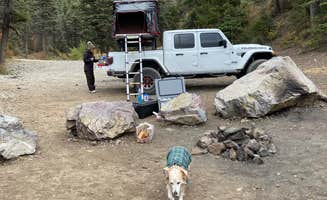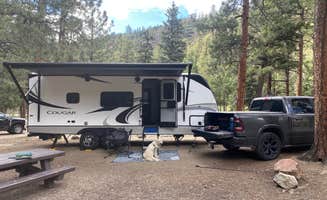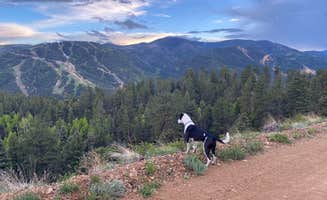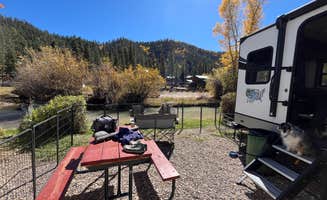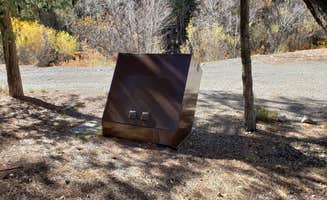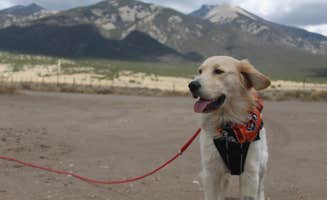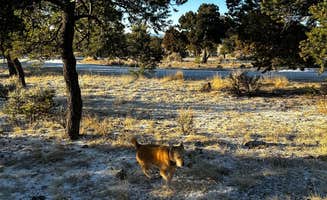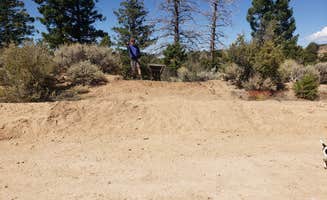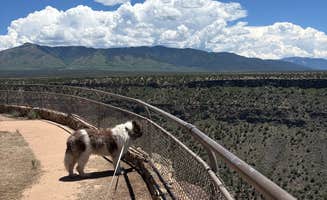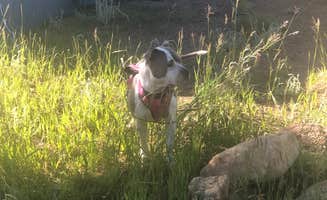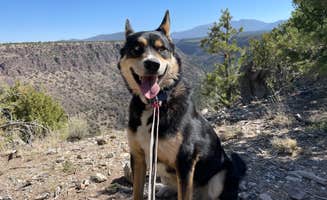Rio Costilla Park stretches across 10,000 acres near Costilla, New Mexico, with elevations ranging from 8,000 to 9,500 feet. The region features alpine lakes, coniferous forests, and is bordered by the Sangre de Cristo Mountains to the east. Summer temperatures typically range from 40°F at night to 80°F during day, with afternoon thunderstorms common in July and August.
What to do
Fishing opportunities: Red River provides quality trout fishing just minutes from camping areas. "Fishing is great and quality waters. It is fisherman's fly fishing dream. Camping is great too as you can park next to the river. It's pricey at 20.00 a night but worth it," notes a visitor to Rio Costilla Park.
Hiking to mountain lakes: Trails lead to several alpine lakes throughout the region. "The hikes they have at this place are great!! It's really neat. If you're lucky, you'll see some deer on one of your hikes. The views you get as you hike farther up the mountain are breathtaking," writes a camper about Rio Costilla Park.
Off-road exploration: Many areas require high-clearance vehicles but reward with access to remote locations. At Cabresto Lake Campground, one reviewer notes, "The road up to the lake is pretty rocky so we had to air down our tires so that we don't get back aches after our day 4x4 goose lake trail getaway."
Tubing on streams: Cool off by floating down mountain streams during summer months. "Stayed two nights and loved every minute. Took inner tubes and rode them down the stream!" shares a visitor about Rio Costilla Park.
What campers like
Secluded camping sites: Many areas offer good separation between campsites for privacy. A camper at Columbine Campground shares, "We went up here for Memorial Day weekend several years ago and stayed at site #26, without reservations. Great shaded site with water flowing behind it, which made for great sleeping."
Mountain wildlife encounters: Local campgrounds offer opportunities to view elk, deer, and even wild horses. At Wild Horse Mountain View, a camper recalls, "We woke up to wild horses close to us. Great spot."
Stargazing conditions: Clear mountain air and minimal light pollution create optimal night sky viewing. "The stars are awesome and so clear at night. Perfect for stargazing," writes a visitor at Wild Horse Mountain View.
Covered picnic areas: Some campgrounds feature roofed picnic tables to provide shade and weather protection. "Some of the camping areas have small, perfectly sized covered picnic table areas which are absolutely wonderful. The campsites are nearly all along a babbling brook, stream, or river," notes a visitor to Rio Costilla Park.
What you should know
Road conditions vary significantly: Many campgrounds require appropriate vehicles to access. A visitor to Cabresto Lake Campground advises, "Definitely need an all terrain vehicle for the drive up to lake. Rough dirt road. Got a flat tire."
Campground amenities differ widely: Research facilities before arrival. "No cell phone reception. There are no water available and porta potties were not ready yet," reports a camper at Rio Costilla Park.
Weather changes rapidly: Mountain climate means quick temperature and condition shifts. At Home Mountain Reservoir SWA, a camper shares, "The weather changes by the minute it seems, and storms move over the area pretty quickly. If you don't like the weather wait five minutes, it'll change, and I'm not exaggerating."
Reservations recommended: Popular campgrounds fill quickly during peak season. "Reservations are a must on summer weekends with some one night only walk-ups available," advises a visitor to Fawn Lakes Campground.
Tips for camping with families
Dog friendly campgrounds near Costilla: Most area campgrounds welcome pets but have specific rules. "They have cattle that roam around the campground so keep your pups on a leash," advises a camper about Rio Costilla Park.
Water play options: Streams and lakes provide natural entertainment for children. A visitor to Fawn Lakes Campground reports, "The lakes were drained but the river was awesome. They had just re-stocked fish so needless to say, the fishing was phenomenal."
Wildlife viewing opportunities: Several campgrounds offer chances to spot native animals. "If you're lucky, you'll see some deer on one of your hikes," notes a Rio Costilla Park visitor, while another mentions, "Not sure how many head of cattle roam the park, but they could care less about you and do not pose any threat."
Variable campsite privacy: Research specific site locations before booking. About Columbine Campground, one camper warns, "Not a terrible campground but, I would not make the drive to stay here again. In my mind there are two sites worth the drive and they are (drumroll please) 13 and 15. If you are a very social person, this is your place."
Tips from RVers
Limited level sites available: Many mountain campgrounds have uneven terrain. At Sanchez Stabilization Reservoir, a visitor notes, "Clean washrooms. Cement picnic tables. About 4 nice camping sites around the lake."
Wind conditions: Some areas experience significant winds that affect RV camping. A Sanchez Stabilization Reservoir camper warns, "Quiet windy. The van is rocking around. Hold onto your car doors when you open them."
Cell service availability: Coverage varies significantly between campgrounds. A visitor to Home Mountain Reservoir SWA notes, "Two bar LTE mobile service," while Road Runner RV Resort campers report better connectivity: "I'm working on this trip and I have 4 bars for AT&T. Not trouble connecting and staying connected with my hotspot."
Gate clearance considerations: Some campgrounds have tight entrances. About Road Runner RV Resort, a visitor advises, "The gate coming into the park is tight so when the gentleman says make a lazy turn he means a REAL lazy turn."


